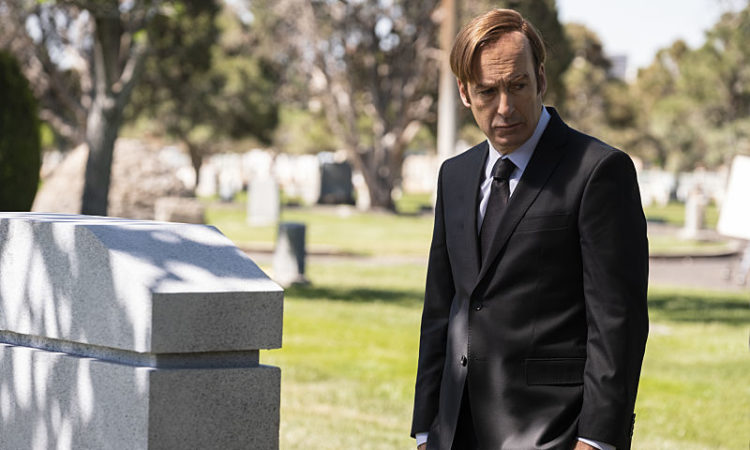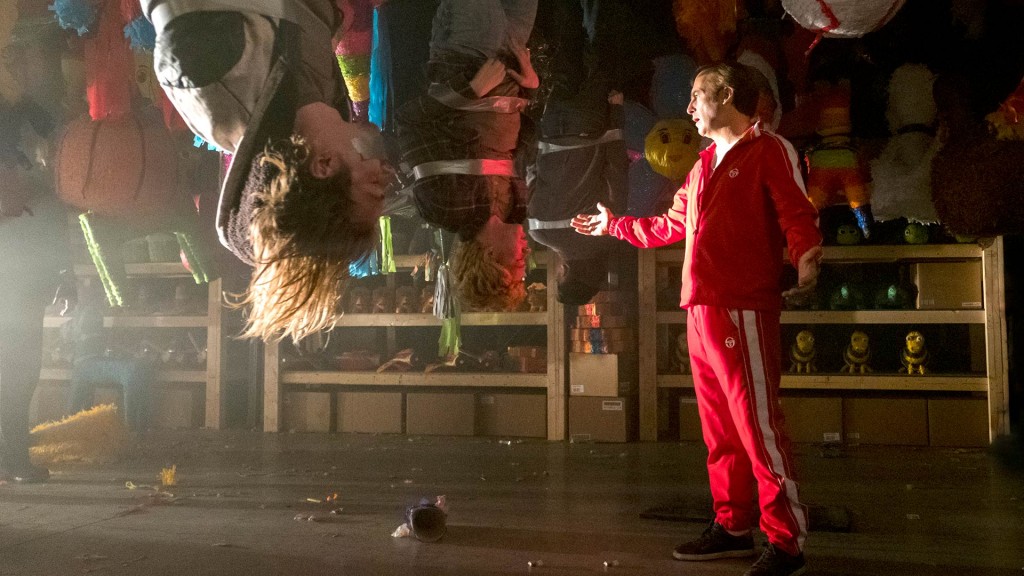-
Recent Posts
- Better Call Saul: There Are No Happy Endings between a “Rock and Hard Place”
- Black Widow Keeps It in the Family for Natasha’s Last Ride
- Loki Finds New Purpose in the Man behind the Mischief
- In its Debut, Star Wars: The Bad Batch Decides Whether to Obey or Rebel
- Nomadland: A Film Out of Time, For Our Times
Archives
Recent Comments
- Ed Clarke on Contact
- Matt on Why “The Frying Game” Is a Dark Horse Contender for The Simpsons’s Worst Episode Ever
- Lilly Dow on Contact
- Stacey on Veep’s Series Finale and the Hollowness of Getting What You Want
- Evan Jaocbs on Contact
Meta
Tag Archives: Mike Ehrmantraut
Better Call Saul: In “Winner” Jimmy McGill Fakes His Grief Until It Changes Him
This whole season, Kim Wexler, and the audience, have been waiting for Jimmy McGill to truly deal with his brother’s death, to genuinely confront Chuck’s passing, rather than try to move on as though nothing had happened. From the season premiere, where Jimmy brushed off Howard’s tortured confession with an unbothered air, to last week’s tantrum over being denied his reinstatement, we’ve seen Jimmy do nothing but sublimate his feelings about his brother’s death. We’ve seen him repress them, run from them, and act out because of them, but never really face them head on.
Better Call Saul Waits for the Other Shoe to Drop in “Wiedersehen”
I miss the approach — popularized by The Wire and used by series as distinct as BoJack Horseman — of series putting their major fireworks in the penultimate episode of the season rather than the finale. It gives the show and the audience a full episode to recover and process all the major events of the season. And it helps avoid the sense in that second-to-last episode that you’re getting more setup than payoff ahead of the series pulling the trigger on its biggest developments.
That’s the problem with “Wiedersehen”, a perfectly good but not outstanding episode of Better Call Saul. It’s not as though there’s nothing happening in the episode. Lalo Salamanca makes overtures to Gus. Werner makes a daring escape from his gilded cage. And Jimmy not only faces a denial of his application reinstatement, but in his anger and disbelief, manages to sabotage his relationship with Kim, which had finally seemed to be on the mend. But all of this feels more like setting the table for bigger resolutions to come in the finale than anything full or complete in the episode itself.
Better Call Saul Still Manages to Surprise and Delight Us in “Coushatta”
Better Call Saul is a show that zigs when you expect it to zag. The series makes its bones as a tragedy, where the events are all the more sad, all the more pitiable, because (most of) the audience knows the unfortunate ends waiting for the show’s main characters. And yet, the series still has an impressive ability to surprise, to delight, to lead you down one path and make you think you know where things are headed, only to take a sudden left turn toward something you might never have expected.
Better Call Saul: The Slow Burn Threatens to Bring Down Jimmy and Kim in “Something Stupid”
I’ve known the evenings, mornings, and days alone,
I have measured out my life in Mesa Verde awards and burner phones.
With my sincerest apologies to T.S. Eliot, it’s amazing how Better Call Saul can move so slowly and then so quickly in the same season, without missing a beat. It’s hard to know exactly how much time has elapsed in the show so far, but this season picked up right where the last one left off and has, more or less, crept along in the aftermath of Chuck’s death and Hector’s “accident” ever since.
That is, until now. If the last episode stood out for how it seemed to set Jimmy and Kim on diverging trajectories, “Something Stupid” takes that idea up a notch, with a cold open set to the famed Sinatra melody that provides the episode’s title. The series taps into its unrivaled ability to craft montages, depicting the passage of time via unwrapped statuettes, filing cabinet labels, and holiday sale signs. But the show goes a step further with its formal creativity, using a well-placed split screen to show how both Kim and Jimmy are flourishing in their new lives, but also how those lives are slowly but surely pulling them further and further apart.
Better Call Saul Sets Jimmy and Kim on Different Paths in “Piñata”
Jimmy and Kim are on different paths; that’s been clear for a while now. But the cold open in “Piñata” makes it literal. The episode starts with a flashback to the halls of HHM, at a time when Jimmy is a gregarious mailroom clerk and Kim’s a precocious law student. Even then, the two share a rapport, but also have obvious differences.
Better Call Saul Veers Ever Closer to Breaking Bad in “Quite a Ride”
Better Call Saul has never been closer to Breaking Bad. That’s not just because this episode opens with this show’s first glimpse of our hero during the Walter White era. It’s not just because Gus Fring seems to nail down his plans for the facility that will one day become Heisenberg’s lab. And it’s not just because Jimmy visits The Dog House, the fast food restaurant and seedy hangout where Jesse Pinkman once sold his drug of choice.
It’s because “Quite a Ride” is about people who are almost peerless at what they do, unable to walk away from it, and the different directions those superlative skills take them. That was the larger story of Breaking Bad, a show devoted to a man who had an undeniable talent, but who could not let it go in the face of the money and long-awaited recognition he thought he was due, even when it came with a side of peril and human misery. Breaking Bad lived on the conflicted thrills of watching someone as talented as Walter White operate at the top of his game in a terrible industry, and earned its emotional resonance from the uncertain but foreboding sense of where those talents would lead him.
Better Call Saul Uses its Timeline to Show Us What’s Bothering Mike in “Talk”
Despite a few similarities (trunk shots for example), Better Call Saul rarely goes for the non-linear storytelling tricks that you might see in a Quentin Tarantino movie. Sure, you may get the periodic flash forward to Cinnabon Gene, or the occasional flashback to some illuminating incident from Jimmy McGill’s old life, but it’s rare that the show depicts the events of the present in something other than chronological order.
It’s noteworthy, then, that in this is episode, we see the end of Mike’s speech in group therapy before we see its beginning. The episode opens with a scene from his past, where Mike is meticulously laying down a slab of concrete and letting his son write his name in the wet cement. It’s a sweet moment, but one tinged with melancholy, and a dissonance when the episode then quickly cuts to Mike in the present, looking out at a stunned room and gruffly remarking that, hey, they wanted him to talk.
Better Call Saul and the Choices We Don’t Have to Make in “Breathe”
One of the most interesting questions to ask — for both real people and characters on television — is why someone chooses to do things they don’t have to. The realities of life can push people toward certain choices, and circumstances often dictate actions. But there are situations in which there’s no external force, no rules or sticks or carrots to poke or prod, just a raw choice to be made. It’s these sorts of choices that can reveal who someone really is and what they’re going through, in a way that’s clearer than with choices that are muddied by pressure and inertia and need.
These are the types of questions that “Breathe” is interested in. Why is Gus Fring not only trying to keep Hector Salamanca alive, but also moving against those who tried to kill him? Why is Kim Wexler attending a meeting to determine Jimmy’s share of Chuck’s estate when Jimmy himself is blowing it off? Why is Mike Ehrmantraut determined to perform his “security consultant” routine on all of Madrigal’s outposts despite Lydia’s objections? And why is Jimmy McGill ready to talk himself out of a job, one he’d just hustled like crazy to earn?
Better Call Saul Leaves Its Audience to Wonder in “Smoke”

Jimmy McGill’s part in “Smoke” begins and ends with normalcy. In his first appearance in the episode, he gets up, feeds his fish, and makes coffee — the regular, mundane tasks of his new life. And in his last scene, he does the same things: joking about his fish’s appetite, tossing out coffee grounds, and seeming like a man very much returned to his routine.
Better Call Saul: Everyone Takes an Extra Step in “Slip”

The opening of “Slip” is a little more direct than episodes of Better Call Saul usually are when filling in some gaps Jimmy’s backstory and philosophy. When Marco presses Jimmy about his parents’ shop, about how they worked hard and everyone liked them, Jimmy admits that’s true, but questions the value of it. He protests that it got them nowhere; he characterizes his own dad as a sucker, and he takes the coin his father once planned to put in the poor box for use in yet another scam.
With that, Jimmy’s perspective on life becomes a little clearer, aligning with the prior flashback to his parents’ store. Papa McGill was someone who refused to bend the rules even a little, who wouldn’t take so much as a moderately-valuable coin for himself, let alone sell cigarettes to the kids from the local religious school to make ends meet. In Jimmy’s eyes, that approach got him nowhere. It’s a little too tidy and pat to account for Jimmy’s actions in the present day, but the man himself sums it up nicely — Papa McGill wasn’t willing to “do what he had to do,” and Jimmy assuredly is.
That’s the thrust of “Slip,” which is as much of an ensemble piece as any episode of Better Call Saul so far. Not only Jimmy, but also Mike, Chuck, Kim, and Nacho, are each willing to go the extra mile, to do the difficult or painful thing, not because they wish to or because it’s easy, but because each believe it’s what they simply need to do to go on. It’s what unites these disparate individuals and their very different challenges here — each of them strains a bit more, goes a little farther, in the name of biting the bullet and doing what needs doing.








